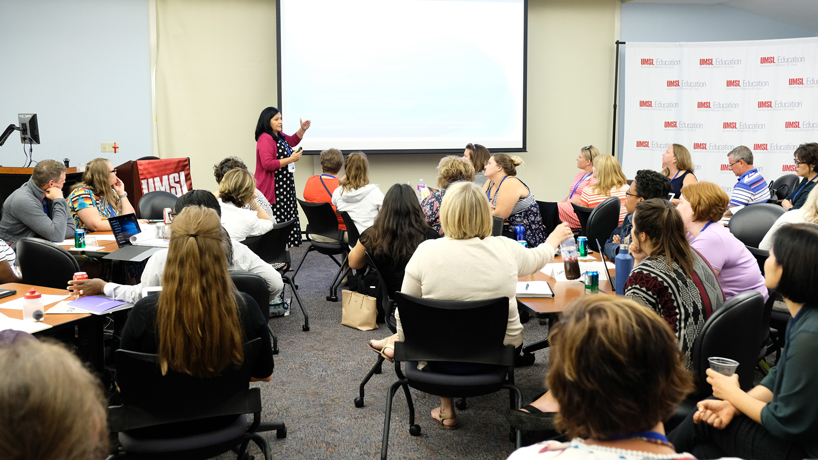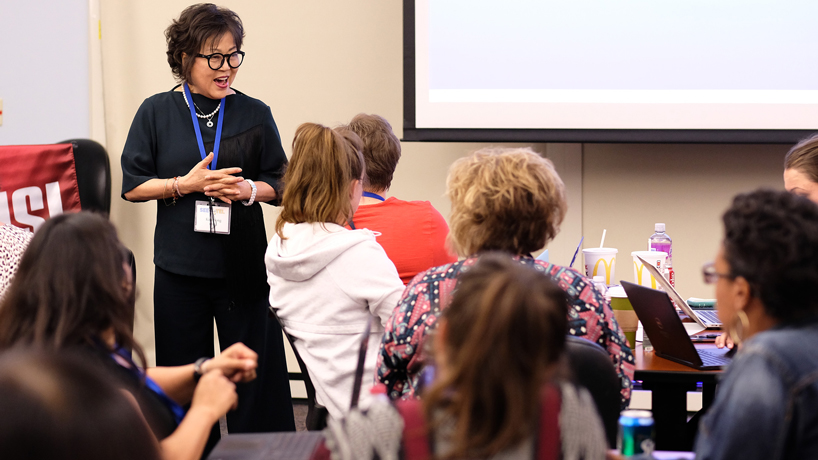
Socorro Herrera, professor at the Kansas State University College of Education and executive director of the Center for Intercultural and Multilingual Advocacy, leads the keynote session at the inaugural SEE-TEL Summer Institute on June 24 in the Boeing Room on the UMSL campus. The four-day event, which sprang from a U.S. Department of Education grant, aims to address the growing need for trained teachers of English-learner students across the state of Missouri. (Photos by August Jennewein)
Socorro Herrera clicked the “forward” button on her control, casting a picture of a student slumped in his chair, hand propping up his head on the screen at the front of the Boeing Room.
He looked as if he could barely keep his eyes open.
“We have fidelity to the curriculum, but where is our fidelity to the child?” Herrera said. “This is what fidelity and accountability to the curriculum looks like in many classrooms for kids that don’t speak English, who are from low socioeconomic levels, who have learning disabilities.”
Herrera, professor at the Kansas State University College of Education and executive director of the Center for Intercultural and Multilingual Advocacy, was the keynote speaker at the inaugural SEE-TEL Summer Institute, which ran from June 23-26 at the University of Missouri–St. Louis.
SEE-TEL – short for “Strengthening Equity and Effectiveness for Teachers of English Learners” – is a joint venture between researchers at UMSL and the University of Missouri–Columbia, aimed at meeting the growing need across the state for teachers and administrators who can educate and connect with students from immigrant communities, for whom English is not their first language.
The initiative came out of a $2.6 million, five-year grant from the U.S. Department of Education’s Office of English Language Acquisition and is working with four school districts across Missouri strategically chosen for their high proportion of English-learner students – Kansas City, Columbia, Bayless in south St. Louis County and Carthage, which is in the southwest corner of the state.
The Summer Institute was the first chance for a cross-section of more than 60 educators from these districts to convene and discuss issues and approaches.

UMSL Associate Professor Kim Song is the principal investigator for the U.S. Department of Education grant that funds the SEE-TEL program.
“Even TESOL educators like myself, we try to force our immigrant families and children to use an English-only approach,” said Kim Song, UMSL associate professor of education and the principal investigator for the grant. “So how we want to start thinking is communicating doesn’t have to use English only. We like to use transcultural, as well as trans-language, approaches.”
Herrera’s session focused on moving “beyond the obvious” with English as a Second Language students. Growing up as a migrant from Mexico and an ESL student herself, Herrera said her teachers were able to connect with her competencies and look past her struggles with writing in English and frequent absences to help her family work in the fields.
She stressed the importance of “biography-driven instruction” for ESL students, catering to their strengths and experiences and then connecting it back to the demands of the curriculum, rather than making the curriculum foremost and watching struggling students fall by the wayside.
“A child doesn’t just need a lifeboat: They need a lifeboat and people tugging them in,” Herrera said. “Every human being comes with assets. Try to weave what they know into teaching difficult new concepts. Being culturally competent is about what we create that has benefits on the human beings in our classroom. How do we meet them? Sometimes we have to walk 90 percent, and they have to walk 10 percent.”
MU Associate Professor Lisa Dorner is one of the co-PIs on the grant and earned the University of Missouri System President’s Award for Intercampus Collaboration in April along with Song. She says the strength of the Summer Institute, and the SEE-TEL program itself, is casting a wide net for TESOL – Teachers of English to Speakers of Other Languages – certification candidates in the four districts.
Instead of just targeting teachers that work with English learners, SEE-TEL aims to educate content-area teachers about how to reach these students in their regular classrooms and give administrators the skills necessary to support ESL initiatives at their schools.
“If I’m a high school algebra teacher and 50 percent of my kids are coming from other language backgrounds, how do I teach math in a way that builds on their home language knowledge and skills, recognizing all the resources they bring into the classroom?” Dorner said. “Rather than thinking, ‘Oh, the EL teacher is going to take care of them,’ we want to shift that mindset to have those classroom teachers share that responsibility and know what to do. Frankly, we don’t teach that, especially in a state like Missouri. We’re trying to change that conversation.”
With the grant still in its early stages, Song is eager to see the impact SEE-TEL can make after working with these educators for five years.
“Teaching is habitual,” Song said, “so hopefully they develop some habits of mind.”














